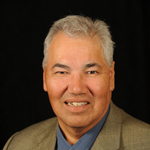The Honourable Mr Justice Murray Sinclair
October 2011 Honorary Degree Recipient

Doctor of Laws (honoris causa)
The Honourable Justice Murray Sinclair is making Canada a more unified nation in which to live – both now and for generations to come.
Justice Sinclair is chair of the Truth and Reconciliation Commission of Canada. He is leading a process to provide a full and public account of what occurred in residential schools in this country. In that process, he is hearing previously untold stories from residential school survivors, their families and their communities.Â
Justice Sinclair has said: “I can assure you that there is a dimension of truth that cannot be found in the pages of a book or in a video. You won’t hear it in the words of a lecturer, a historian or a research expert....We will find it in the eyes of the survivors from across the kitchen table or a living room, perhaps in a small community or perhaps sitting on a porch. It comes from the voices that in many cases have never spoken that history before.”
Through this sharing of experiences and a series of national events – one of which will be held in Halifax later this month – it is hoped a new understanding will emerge and paths to reconciliation will be created. Heading such a commission requires leadership, compassion and integrity. These are all qualities that Justice Sinclair exemplifies in his personal and professional life.
It is truly an honour for us to have Justice Murray Sinclair with us today.
In 1988, Justice Sinclair became Manitoba’s first aboriginal judge and only the second in the country. In 2001 he was appointed a judge of the province’s Court of Queen’s Bench. Throughout his legal career, he has generously given of himself and his expertise – taking on challenges that others might shy away from.Â
For example, from 1988 to 1991, Justice Sinclair was co-commissioner of the Aboriginal Justice Inquiry of Manitoba, a tremendous undertaking that resulted in some 300 recommendations. In addition to providing specific counsel, the inquiry offered insight on a much larger scale.
As the report noted, “Far more important than these reforms is our conclusion that the relationship between Aboriginal people and the rest of society must be transformed fundamentally. This transformation must be based on justice in its broadest sense....”
Justice Sinclair has shared his depth of understanding of aboriginal issues provincially, nationally and internationally. He has the respect of his community, the students he has taught at the University of Manitoba, fellow educators and judicial peers.
In a letter of support for Justice Sinclair’s honorary degree nomination, the Honourable Michael MacDonald, Chief Justice of Nova Scotia, said: “He represents a bright light illuminating Canada’s untold aboriginal story for the entire Canadian judiciary to see and appreciate. Furthermore, he shares his unique perspective with humility, thoughtfulness, balance and wisdom.”
Our ±«Óătv community has also benefited from Justice Sinclair’s perspective. Last year, he participated in the 20th anniversary celebrations of our law school’s Indigenous Blacks & Mi’kmaq Initiative, and spoke to students and alumni.
Justice Sinclair’s many contributions were recognized through a National Aboriginal Achievement Award in 1994. He has received honorary degrees from the University of Ottawa, St. John’s College and the University of Manitoba. He has also been presented honorary diplomas from Red River College and then Keewatin Community College.
Justice Sinclair and his family belong to the Peguis First Nation. He and his wife, Katherine Morrisseau-Sinclair, played a part in starting an Ojibwa immersion nursery school program in Winnipeg. He has co-chaired the North American Indigenous Games and served on a number of boards, including that of the Winnipeg Native Alliance.
For the leadership he has given our country, the impact of which will be felt long into the future, I ask you, Mr. Chancellor, in the name of the Senate, to bestow on Justice Murray Sinclair the degree of Doctor of Laws, honoris causa.
